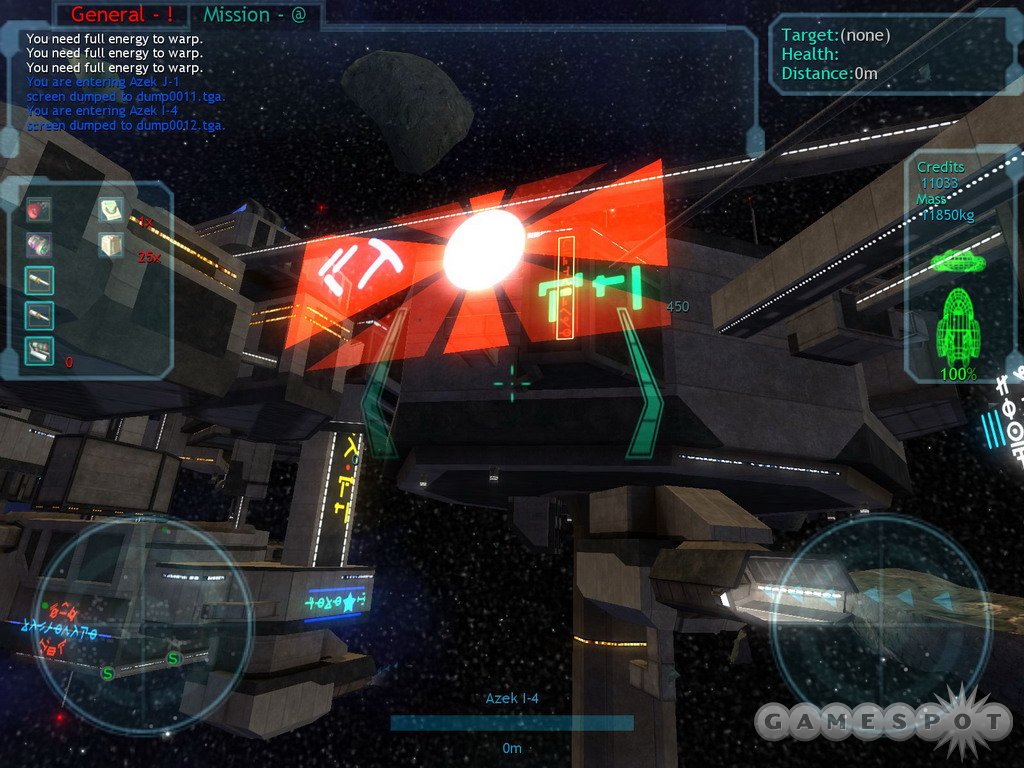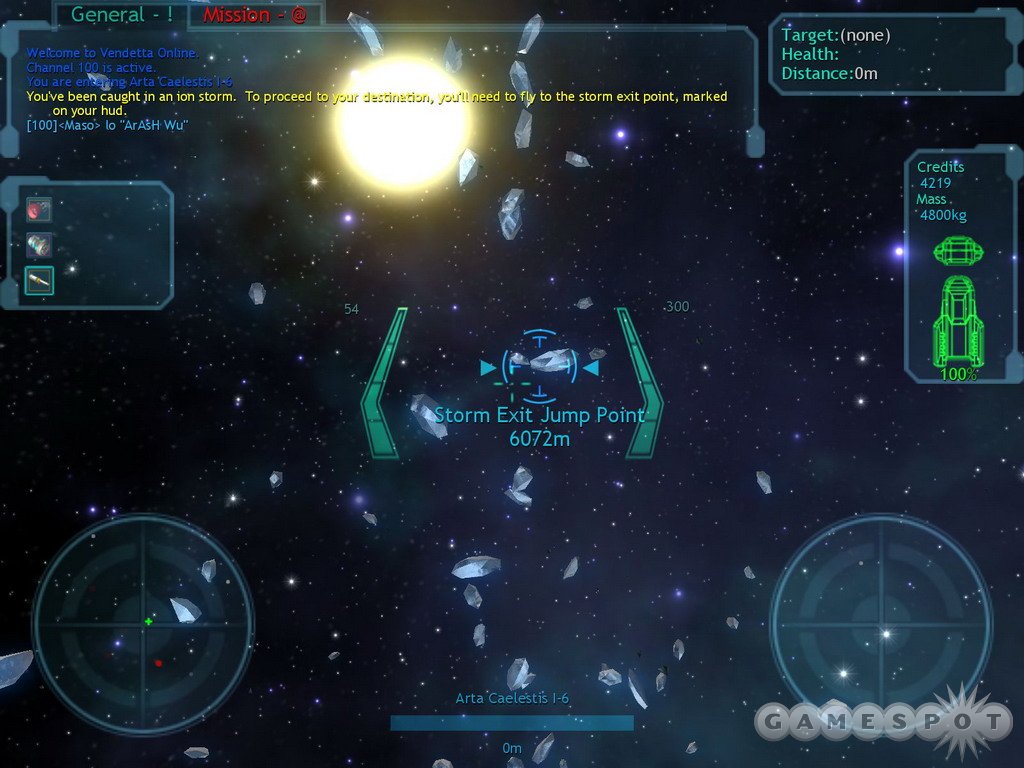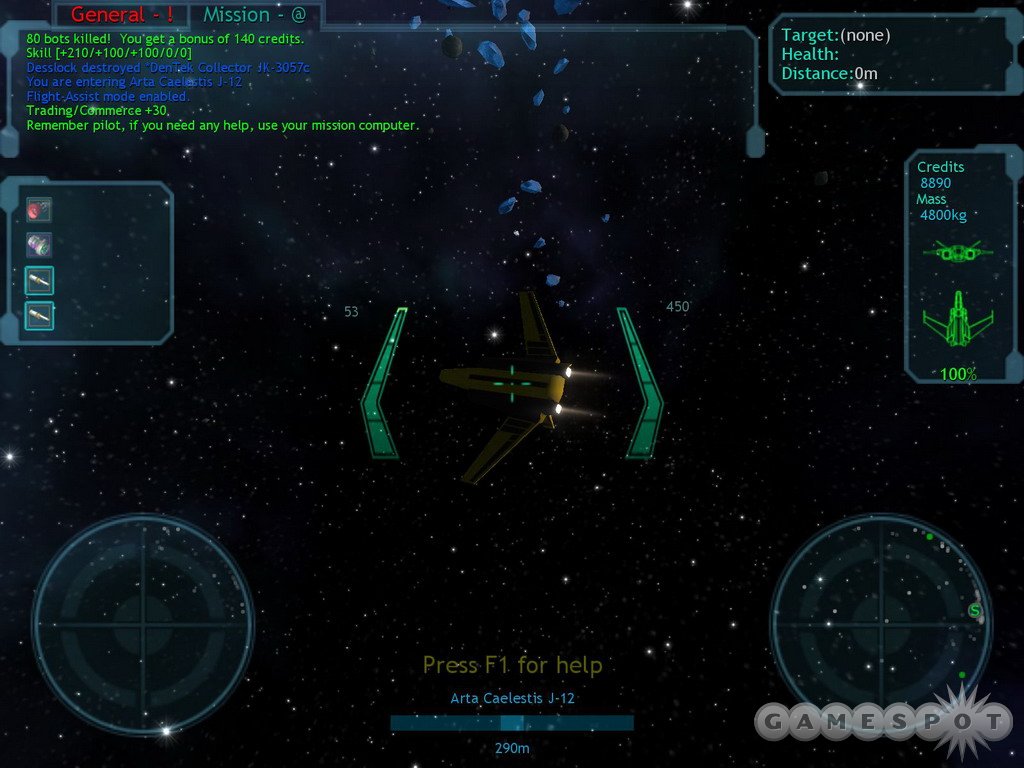Back in the early massively multiplayer salad days, several developers gambled that space sims would be the next big online genre. Those bets largely didn't pay off, as online space sims have struggled commercially, even when they were critically well received. Microsoft, 3DO, and EA launched and then abandoned Allegiance, Jumpgate, and Earth & Beyond, respectively. But with less green expectations, smaller developers still hope to prove the genre's potential. Vendetta Online was largely created by four individuals, and its modest production budget is sometimes unkindly evident. Yet the game offers a reasonably effective mix of space-based trading and multiplayer combat.

Vendetta Online's combat is twitch-based, but unlike most space sims, it doesn't unfold like a flight sim in space. Fights don't feel like traditional dogfights where you maneuver to tail enemy ships, and you are able to avoid the tiresome turning battles into which those skirmishes frequently devolve. The most effective evasive tactics are actually side-strafing and rolling rather than turning. Joystick support is included, but a keyboard/mouse combo is also effective. You can use a flight-assisted flight model that always moves your ship in the direction it's facing, or you can turn off that assistance in order to retain momentum and move and fire in different directions. Disabling flight assistance also allows you to maneuver backward, which, combined with the need to make frequent use of the strafing keys, makes combat almost feel like you're playing a first-person shooter instead of a flight sim. Missiles are deliberately weaker threats than they typically are in space sims, which forces you to rely primarily upon energy weapons and your own aiming abilities. The game's novel combat system requires you to overcome a bit of a learning curve to become proficient, but it does a good job of making battles feel tactically dynamic.
The setting is a distant galaxy, a few thousand years from now. The galaxy is controlled by three human factions, two of which are at war while the third comprises independent traders. You can create a character from any of these three factions, but your choice only affects your initial reputation with the other factions and various other groups in the galaxy. Choose one of the warring factions and you'll be unable to freely enter into systems controlled by the opposing faction. There are nine common ship types, each of which has several variants, and there's also a unique ship type for each of the three playable factions. The choice between factions isn't particularly meaningful. Since there's only one online server, you could make an alternate character from one of the opposing factions solely to spy on enemy ship movements. But the gaming world really isn't dynamic enough to make doing so worthwhile.

The galaxy consists of 30 sectors, and each sector is divided into 256 different jump zones. The environments are colorful and stocked full of suitable asteroids and crystals, although there's not a tremendous amount of variety and the graphics are only decent. Sound effects are rudimentary and the music lacks variety, but it is suitably atmospheric. Ships are a hodgepodge of uninspired geometric shapes, and space stations aren't particularly large. There are also no capital ships. The developers gave one faction a dreadnought in the beta, but they were forced to remove it from the retail release until they manage to correct its artificial intelligence navigation and other issues.
Aside from exploring, you can mine asteroids, uncover lucrative trading routes, or fight bots. While there are computer-controlled ships to protect space stations and to fight, most of the dynamic activity is provided by other players. Freelancer did a better job at creating the illusion of a dynamic setting by having effective AI convoys and patrols. You also can't build or own structures or trading empires and you can't control more than a single vessel at a time, as you could in X2: The Threat. One cool feature that adds life to the galaxy is the bounty system, which rewards players for dispatching characters that have notorious reputations. Collecting a large bounty provides a cash reward and is also reported in text-news dispatches that can be read at space stations.
Each character can gain license ranks in five different skills: combat, light weapons, heavy weapons, mining, and trading. You can improve your skills by engaging in related activities or undertaking missions that are obtained from space stations. The missions include relatively simple tasks oriented around combat training, prospecting, mining, spying, or trading. You can only take on a single mission at a time, even though many have complementary goals. Successfully completing a mission improves your reputation with the faction that gave you the chore and rewards you with cash and skill experience. Although it's disappointing that mission goals aren't more sophisticated and don't better integrate with the setting's background plot, they do offer an efficient way to make cash and improve your license rankings. There are a sparse number of badges that can be earned by completing missions, but the badge system isn't documented and doesn't seem very fleshed out. Higher ranks grant access to better weapons and equipment. Ranks are also relevant for player- versus-player battles, since characters are penalized for attacking opponents who have significantly lower license levels. Gaining levels is the typical MMO grind, although you gain access to a decent variety of ships and weaponry very quickly.
Vendetta Online's biggest problem is that it's somewhat lacking in content for an online game that charges monthly subscription fees. That concern is mitigated by the fact that you can download the game for free and monthly fees are only $9.95/month. For under $20 or about half the price of an average retail game, you could get a couple of months of Vendetta Online. That's a fair price point, since, aside from the opportunity to play with a group of 25 to 100 players (which seems to be the average number playing at any particular time), Vendetta Online is missing a number of desirable features, which space sims that don't charge subscription fees have delivered. Aside from accommodating a larger number of players, Vendetta Online feels a lot like the persistent servers that players could establish with the retail release of Freelancer. It also doesn't yet offer large capital ship battles or the ability to create a fleet or self-sustaining economic empire, which games such as FreeSpace 2 and X2: The Threat allowed.
The developers are committed to adding content and gameplay, and they have already introduced some significant additions since the game was initially unveiled, including the mining system and "capture the cargo" multiplayer battles. The capture the cargo system gives the two main warring factions the opportunity to gain access to special weaponry by attacking certain convoys of the other faction. Weekly stats are tracked, and the faction that is most successful in getting its own cargo through the gauntlet during the prior week gets access to special weaponry. It's a great feature, and similar dynamic elements would further help the game live up to its potential. In its current state, Vendetta Online is a decent sim that does things mostly right. It provides a solid framework for an online space sim, but it needs additional content to build and sustain its appeal.
